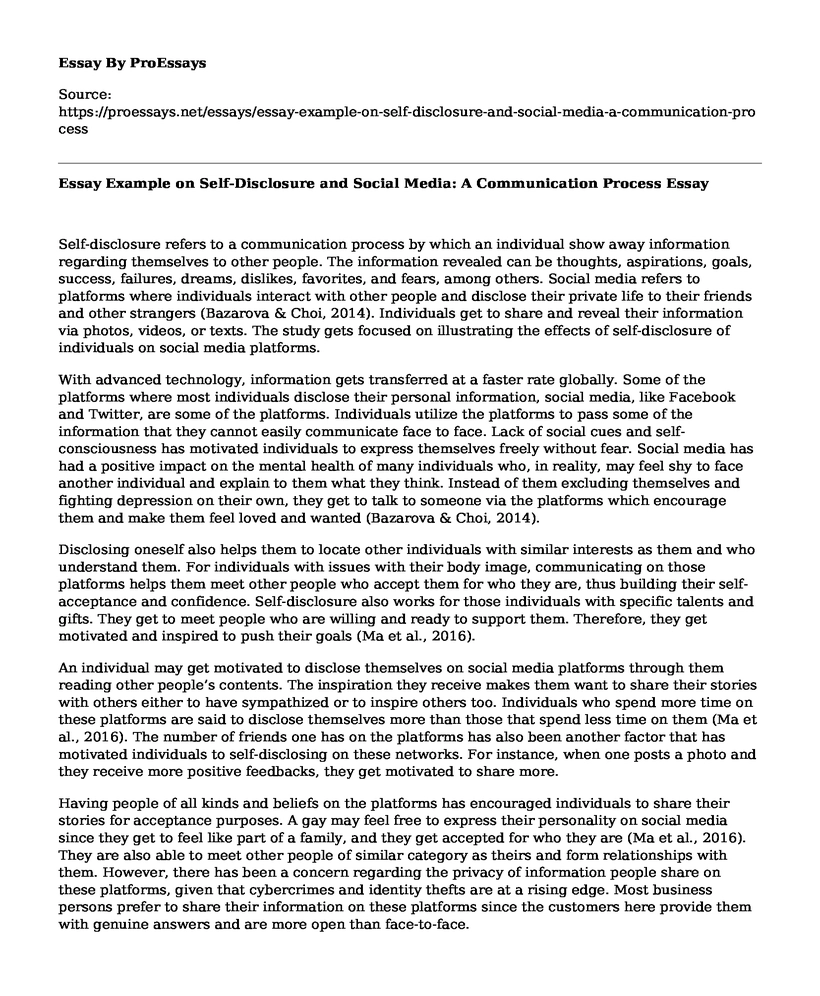Self-disclosure refers to a communication process by which an individual show away information regarding themselves to other people. The information revealed can be thoughts, aspirations, goals, success, failures, dreams, dislikes, favorites, and fears, among others. Social media refers to platforms where individuals interact with other people and disclose their private life to their friends and other strangers (Bazarova & Choi, 2014). Individuals get to share and reveal their information via photos, videos, or texts. The study gets focused on illustrating the effects of self-disclosure of individuals on social media platforms.
With advanced technology, information gets transferred at a faster rate globally. Some of the platforms where most individuals disclose their personal information, social media, like Facebook and Twitter, are some of the platforms. Individuals utilize the platforms to pass some of the information that they cannot easily communicate face to face. Lack of social cues and self-consciousness has motivated individuals to express themselves freely without fear. Social media has had a positive impact on the mental health of many individuals who, in reality, may feel shy to face another individual and explain to them what they think. Instead of them excluding themselves and fighting depression on their own, they get to talk to someone via the platforms which encourage them and make them feel loved and wanted (Bazarova & Choi, 2014).
Disclosing oneself also helps them to locate other individuals with similar interests as them and who understand them. For individuals with issues with their body image, communicating on those platforms helps them meet other people who accept them for who they are, thus building their self-acceptance and confidence. Self-disclosure also works for those individuals with specific talents and gifts. They get to meet people who are willing and ready to support them. Therefore, they get motivated and inspired to push their goals (Ma et al., 2016).
An individual may get motivated to disclose themselves on social media platforms through them reading other people’s contents. The inspiration they receive makes them want to share their stories with others either to have sympathized or to inspire others too. Individuals who spend more time on these platforms are said to disclose themselves more than those that spend less time on them (Ma et al., 2016). The number of friends one has on the platforms has also been another factor that has motivated individuals to self-disclosing on these networks. For instance, when one posts a photo and they receive more positive feedbacks, they get motivated to share more.
Having people of all kinds and beliefs on the platforms has encouraged individuals to share their stories for acceptance purposes. A gay may feel free to express their personality on social media since they get to feel like part of a family, and they get accepted for who they are (Ma et al., 2016). They are also able to meet other people of similar category as theirs and form relationships with them. However, there has been a concern regarding the privacy of information people share on these platforms, given that cybercrimes and identity thefts are at a rising edge. Most business persons prefer to share their information on these platforms since the customers here provide them with genuine answers and are more open than face-to-face.
Conclusion
From the above illustrations, it is evident that social media platforms play a significant role in individual self-disclosure. The acceptance, motivation, and inspiration they receive from these platforms contribute much to their disclosure. Despite the many risks their information may be exposed to, the positive impact they receive from sharing their information motivates them not to quit.
References
Bazarova, N. N., & Choi, Y. H. (2014). Self-disclosure in social media: Extending the functional approach to disclosure motivations and characteristics on social network sites. Journal of Communication, 64(4), 635-657. https://www.researchgate.net/profile/Natalya_Natalie_Bazarova/publication/264792898_Self-Disclosure_in_Social_Media_Extending_the_Functional_Approach_to_Disclosure_Motivations_and_Characteristics_on_Social_Network_SitesAn_earlier/links/56c4c95408aea564e304d665.pdf
Ma, X., Hancock, J., & Naaman, M. (2016, May). Anonymity, intimacy, and self-disclosure in social media. In Proceedings of the 2016 CHI conference on human factors in computing systems (pp. 3857-3869). https://dl.acm.org/doi/pdf/10.1145/2858036.2858414
Cite this page
Essay Example on Self-Disclosure and Social Media: A Communication Process. (2023, Sep 03). Retrieved from https://proessays.net/essays/essay-example-on-self-disclosure-and-social-media-a-communication-process
If you are the original author of this essay and no longer wish to have it published on the ProEssays website, please click below to request its removal:
- True Photographs and False Memories Essay
- Shaw Shank Redemption Ethical Dilemmas - Film Analysis Essay
- The Big Short and No Impact Man Films Analysis Essay
- Essay Sample on How Films Use Mise En Scene & Cinematography: A Micro-Feature Analysis
- Essay Sample on Michael Jackson: The King of Pop, Born in Gary, India, 1958
- Essay on the Rise of Brian Ulrich: Capturing Dark Stores, Ghostboxes, and Dead Malls
- Paper Example on The Departed: Climbing from Humble Beginnings to Serving the Law







